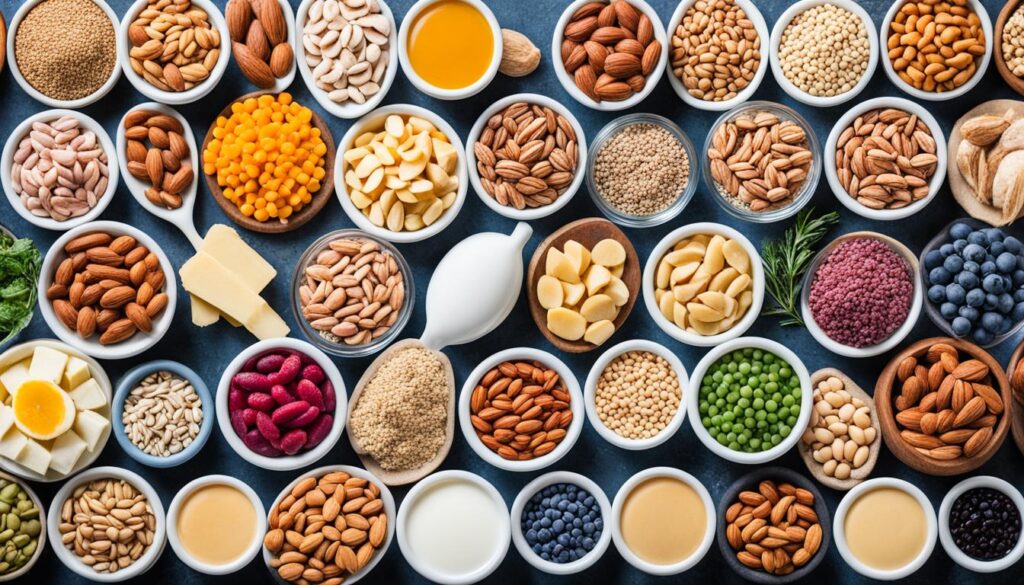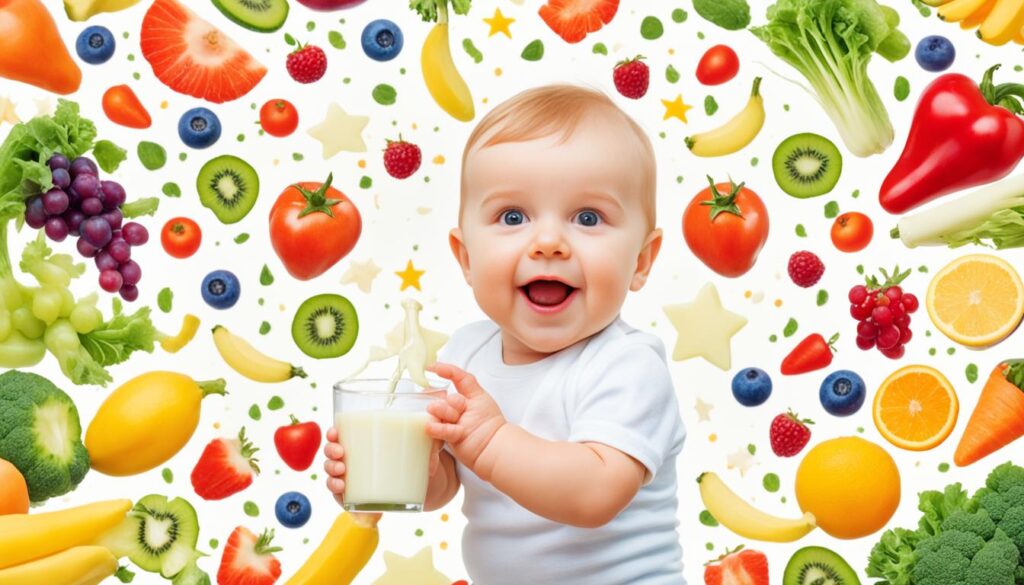As a new mom, I was both excited and nervous when my baby first breastfed. All I wanted was to make sure my baby got the right nutrients for growth and health.
I focused on eating foods that were rich in nutrients and calories. This helped boost my milk supply and supported my baby’s weight gain. I included foods known to help with milk production.
I often ate energy-rich meals and drank smoothies that were good for lactation. I worked hard to ensure my baby was gaining weight well, thanks to my nutritious diet. My aim was to provide my baby with a strong start, all through the goodness of my breast milk.
Key Takeaways
- Breastfeeding moms may need an extra 330-400 calories per day to support milk production1
- Consuming nutrient-dense foods like fish, seafood, fruits, and vegetables can provide essential macro- and micronutrients2
- Breastfeeding mothers should include protein, fruits, vegetables, and whole grains in their daily diet3
- Certain “galactagogue” foods like carrots, dill, and pumpkin can help boost milk supply1
- Limiting caffeine and avoiding alcohol can help ensure a safe, high-quality breast milk for baby1
Understanding the Importance of Nutrition During Breastfeeding
Being a mom who breastfeeds means your milk is key for baby’s nutrition, no matter what you eat.1 Eating well is still important. It boosts the good stuff in your milk. So, enjoy a balanced diet full of nutrients to help your baby thrive.
Your Milk Will Provide What Your Baby Needs
Your body knows just what your baby needs in the milk it makes.4 It changes as your baby grows. So, while eating right is vital, know your milk is customized for your little one.
Impact of Diet on Breast Milk Quality
What you eat greatly affects your milk’s quality.15 Eating a variety of healthy foods ensures your milk has the best nutrition for your baby. Think rich in proteins, fruits, and veggies.
Choosing the right foods makes your milk a powerhouse of vitamins and minerals.4 It not only helps baby grow strong, but it keeps you energized. This is vital during the time after birth when you need extra support.
Essential Nutrients for Breastfeeding Moms
Being a mom who breastfeeds, I focus on eating a balanced diet. This diet includes protein, fruits, vegetables, and whole grains. Staying hydrated is key, too. These foods and drinks help me stay healthy, recover well, and make sure my baby gets the best through my milk.
Protein-Rich Foods
I make sure to eat protein-rich foods 2-3 times every day. These include lean meat, poultry, fish, eggs, and dairy. Beans, nuts, and seeds are also great. They keep my energy up and help me make enough breast milk.1
Fruits and Vegetables
I aim for three vegetable servings, picking dark green and yellow ones. I also eat two servings of fruit daily.1 These foods are full of vitamins, minerals, and antioxidants. They’re good for me and my milk.
Whole Grains
Eating whole grains is important for me. Whole wheat breads, pasta, and oatmeal give me good carbs. They also have nutrients for my body and milk.1
Staying Hydrated
Drinking enough water is vital while I breastfeed. I keep water with me all day. It helps with my thirst and makes sure I have enough milk for my baby.1

Calorie Requirements During Breastfeeding
Breastfeeding needs more calorie intake for milk and your baby’s weight gain. If you’re trying to lose your baby weight, this extra breastfeeding calorie needs will help. But if you’ve lost the baby weight, then eating 500-600 more calories each day might be necessary.2
After about 6 months, when your baby starts eating other foods, you’ll make less milk. Then, you can slowly eat fewer calories.2
| Nutrient | Calorie Content |
|---|---|
| Breast Milk | 65-75 calories per 100-milliliter portion2 |
| Additional Calorie Needs During Breastfeeding | 330-400 calories per day1 |
Breast milk’s calorie intake can differ. The milk towards the end of a feeding has 7-11 more calories per ounce. Eating a diet full of nutrients meets your extra breastfeeding calorie needs. This helps your baby grow well.
Alcohol and Caffeine Consumption
Being a breastfeeding mom makes me careful about alcohol and caffeine. A little alcohol is okay, but I must time it right. I don’t want my baby to get any alcohol from my milk.1
Drinking Alcohol Responsibly
After drinking, I wait before I breastfeed or pump. Normally, after 2-3 hours, my system is clean. So, no alcohol goes to my baby through my milk.1 Yet, if I still feel drunk or my milk is in full supply, I might need to throw it away. This stops my baby from getting any alcohol.1
Caffeine’s Effects on Breast Milk
For caffeine, I try to have no more than 2-3 cups daily. Too much might upset the baby or affect their sleep.1 I love coffee and tea but keep it in check for my baby’s sake.
I watch my alcohol and caffeine for my baby’s health. Being a little careful helps me feed my baby well.
Boosting Breast Milk with Nutrient-Dense Foods
As a mom who breastfeeds, I focus on eating foods that are full of nutrients. This helps my body make the best milk for my baby. I pay special attention to omega-3 fatty acids and food colors and flavors. Adding these to my meals makes the most perfect milk for my baby’s growth and health.
Omega-3 Fatty Acids
Getting enough DHA, a key omega-3 fatty acid, is vital for my baby’s brain growth.2 I eat fish rich in DHA – like salmon, bluefish, bass, and trout – 2-3 times a week to up the DHA in my milk.2 This boost is great for my baby’s brain and eyes.
Food Colors and Flavors
The colors and flavors of what I eat change my breast milk’s makeup.2 Right at the start, my milk is more watery. But as my baby feeds, it turns thicker and full of fat and calories. This makes trying new tastes important since it prepares my baby for eating solid foods.
By focusing on omega-3s and making the milk rich in food colors and flavors, I help my baby’s growth really well.26

Handling Potential Food Allergies in Babies
As a breastfeeding mom, it’s key to know that your baby might get a food allergy. They could react to foods you eat. Dairy, soy, wheat, and eggs are the main culprits. Fish, nuts, peanuts, and corn are also potential allergens.7
Common Allergens
Dairy, like cow’s milk, is a big food allergy trigger. It must be labeled on foods, thanks to a law from 2006.7 Soy, wheat, and eggs are also big causes of allergies for breastfed babies.7
Keeping a Food Diary
To identify a food allergy, keep a food diary. Note what you eat and any baby reactions. These can be things like eczema, stomach issues, or breathing trouble.7
This diary helps doctors find the allergy. Your detailed records are key.
Seeking Professional Guidance
Allergy tests for infants often don’t give clear answers. It’s tough to pinpoint the allergy exactly.7 Babies might have to avoid certain foods, like dairy, until they’re 1.7
Getting help from a lactation consultant or a doctor is very important. They will guide you. This support is vital for managing your baby’s allergies. It makes sure your baby continues to grow well.
Remember, breast milk is very good for babies. It protects them from sickness and helps their brain grow better. Plus, it lowers risks of diabetes and being too big. Many babies stop being allergic to some foods by their first birthday. So, you can often keep breastfeeding if you and your baby want to.7
What to Eat While Breastfeeding to Increase Baby Weight
Certain foods can boost the amount and quality of your breast milk. This helps your baby gain weight. Good choices to include are:
Carrots for Cooling and Fragrant Milk
Carrots are high in beta-carotene. This brings a sweet smell to your milk. Drinking carrot juice or eating roasted carrots can both help.
They’re tasty and healthy ways to up your milk amount. Plus, they satisfy your little one.
Dill for Increased Milk Supply
Dill boosts your milk production. It’s a natural helper. Add fresh dill to meals or drink dill tea for more milk.
This easy step can up the milk for your growing baby.
Dandelion Leaf Juice for Nutrient-Rich Milk
Dandelion leaves offer lots of good stuff for your milk. They’re full of vitamins and antioxidants.
Try juicing them or adding to salads and smoothies. This helps give your baby nutrient-packed milk.
Brown Rice Water for Thicker Milk
Brown rice water makes your breast milk thicker. It’s more nourishing for your baby.2
Boil brown rice in water. Then, drink the liquid. It’s good and good for the baby, too.
Spinach for Nutritious Milk
Spinach is full of vitamins and minerals. It makes your milk top-quality.2
Add spinach to your meals. You can have it in salads, smoothies, or cooked. Your baby gets great nutrition for growing strong.
Panax Ginseng Leaves for Abundant Milk
Panax ginseng is an herb that boosts milk supply. It makes more milk for your baby.3
Use ginseng leaves in cooking or make tea with them. This natural way helps you make more milk.
Pumpkin for Thicker, Fragrant Milk
Pumpkin makes your milk thicker and smells nice. It’s full of nutrients.3
Roast, blend into soups or smoothies, or have as a snack. This makes your milk better and more plentiful.
Conclusion
Providing the best breastfeeding nutrition for my baby is key. A diet full of protein, fruits, veggies, grains, and good fats is what I aim for. This boosts my milk supply and helps baby grow well.8 Adding lactation-boosting foods like carrots and dill supports my baby’s weight gain.9 I feel sure that the right diet and patience can give my baby a strong start.
Breastfeeding rates have changed over the years, especially for black women. They have lower rates than white women.8 Yet, I promise to give my baby top nutrition. Eating enough calories, protein, and omega-3s helps my baby grow right.10
With help from lactation experts and a focus on the lactation-boosting diet, I can feed my baby well. This also helps their weight gain.8 A health-focused diet for breastfeeding sets up my child for a healthy life.
FAQ
What are the best nutrient-dense foods to eat while breastfeeding to increase my baby’s weight?
How does my diet impact the quality and quantity of my breast milk?
What are the essential nutrients I should focus on during breastfeeding?
How many additional calories do I need while breastfeeding?
Is it safe to consume alcohol or caffeine while breastfeeding?
Can the foods I eat while breastfeeding cause food allergies in my baby?
What are some specific lactation-boosting foods that can help increase my baby’s weight?
Source Links
- https://www.mayoclinic.org/healthy-lifestyle/infant-and-toddler-health/in-depth/breastfeeding-nutrition/art-20046912
- https://www.healthline.com/nutrition/breastfeeding-diet-101
- https://www.chop.edu/pages/diet-breastfeeding-mothers
- https://www.ncbi.nlm.nih.gov/pmc/articles/PMC10818638/
- https://www.uptodate.com/contents/health-and-nutrition-during-breastfeeding-beyond-the-basics/print
- https://www.healthline.com/health/parenting/lactation-boosting-recipes
- https://www.chop.edu/pages/breastfeeding-baby-food-allergies
- https://www.ncbi.nlm.nih.gov/books/NBK235600/
- https://www.topnutritioncoaching.com/blog/best-diet-for-breastfeeding
- https://www.ncbi.nlm.nih.gov/pmc/articles/PMC6924239/

Aine Austria is a content creator, freelancer, entrepreneur, essential oils educator, nacho lover, and mom to an adorable daughter. She helps aspiring mom bloggers and entrepreneurs launch their blog, alongside other money-making opportunities. Aine believes that everyone has a story to tell and that their experiences and talents can be shared with the world.
Aine’s passion for writing and sharing her knowledge with others started at a young age. Growing up, she always loved to read books, write stories, and express herself through words. She strongly believes that moms can still pursue their dreams and passions while raising a family, and she aims to inspire other moms to do the same through her work.

Leave a Reply